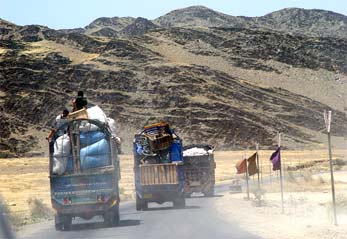Security vital for repatriation, say Afghan, Pakistani officials
Security vital for repatriation, say Afghan, Pakistani officials

DUBAI, Dec 3 (UNHCR) - Government officials from Afghanistan and Pakistan meeting together with senior UNHCR staff today in the third tripartite meeting to discuss refugee repatriation said that security in Afghanistan is an absolute requirement for the resumption of returns and a successful repatriation.
The parties were meeting in the United Arab Emirates two weeks after the death of Bettina Goislard, a UN refugee agency field worker killed by pro-Taliban assailants in Ghazni, eastern Afghanistan.
The murder of Goislard, following a string of fatal attacks on staff from other aid agencies since earlier this year, forced UNHCR to temporarily suspend activities and withdraw its international staff from offices in the south and east of the country.
Officials meeting in Dubai agreed that law and order were a responsibility of the Transitional Islamic State of Afghanistan, but acknowledged that security along shared borders is a regional responsibility.
The Kabul government delegation at the Dubai talks was led by Deputy Minister of Refugees and Repatriation Mohammad Naeem Ghiaci, while Pakistan's delegation was led by Pervaiz Saleem from the Ministry of Kashmir Affairs, Northern Areas, States and Frontier Regions (KANA and SAFRON), which oversee refugee matters. The discussions were chaired by Filippo Grandi and Philip Karani from UNHCR's Afghanistan and Pakistan offices, respectively.
More than 340,000 Afghan refugees have gone home so far this year. Returns have dropped due to the temporarily closure of UNHCR's repatriation centres inside Afghanistan following Goislard's death. Including returnees over 2002, the refugee agency and its Afghan partners have so far helped more than 1.8 million refugees to return from Pakistan since the repatriation operation started in March 2002.
With Afghanistan's Loya Jirga or grand council preparing to meet in Kabul later this month to debate and ratify a new constitution to pave the way for national elections slated for next June, the officials agreed that refugees should be registered so that they are able to vote in Afghanistan's planned 2004 national elections.
The Afghan government and UNHCR pledged to petition the Joint Electoral Management Body, the office charged with overseeing voter registration, to include Afghans outside their homeland. The Pakistan government agreed to facilitate the registration process on its territory.
The parties reviewed the issue of Afghans detained in Pakistani prisons and were pleased to find that the number of Afghans held under the Foreigners' Act has declined over the past three months following interventions by SAFRON officials.
The Tripartite Commission also discussed a number of practical issues that would help Afghan refugees return from Pakistan. It agreed to strengthen existing facilities tasked with resolving legal disputes that could otherwise impede repatriation. Afghanistan announced positive developments with regard to customs and travel permits.
All parties stressed the need for greater international financial support for Afghanistan's economic recovery, particularly in areas likely to experience refugee returns. However, like repatriation, development programmes are dependent on improved security conditions. Pakistan's officials confirmed their government's offers of development assistance earmarked to areas of potential high return.
As decided at the Commission's previous meeting in Kabul in August, refugee camps marked for consolidation in Pakistan's North-West Frontier Province and Balochistan will be closed in March 2004. The remaining refugees will have the option of relocating to a selected site or repatriating voluntarily.
Other issues under discussion included Pakistan's proposed census of Afghans in the country. With assistance from the National Census and Population Commission, SAFRON is in the process of developing a plan of action for the census, and has invited UNHCR and the Afghan Ministry of Refugees and repatriation (MoRR) to provide technical advice.
The Commission heard a UNHCR presentation on medium- and long-term perspectives for Afghan displacement in the region. In January 2004, UNHCR will share results of a comprehensive survey of obstacles to repatriation, which should lead to greater understanding of complexities faced by Afghans - both those who have returned and those who will consider repatriation in the near future.
The Tripartite Commission will next convene in Islamabad in early March under the chairmanship of the government of Pakistan.







